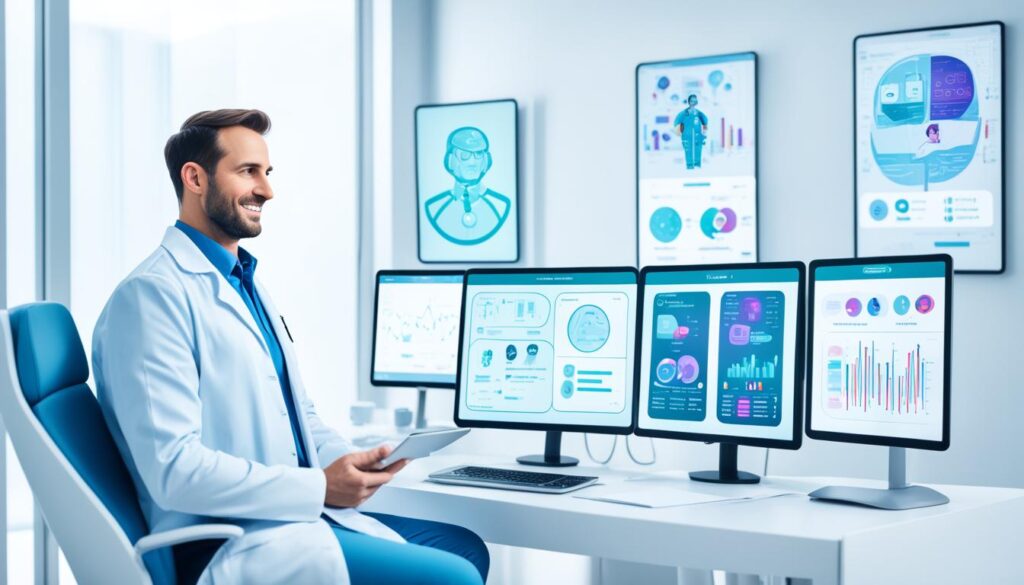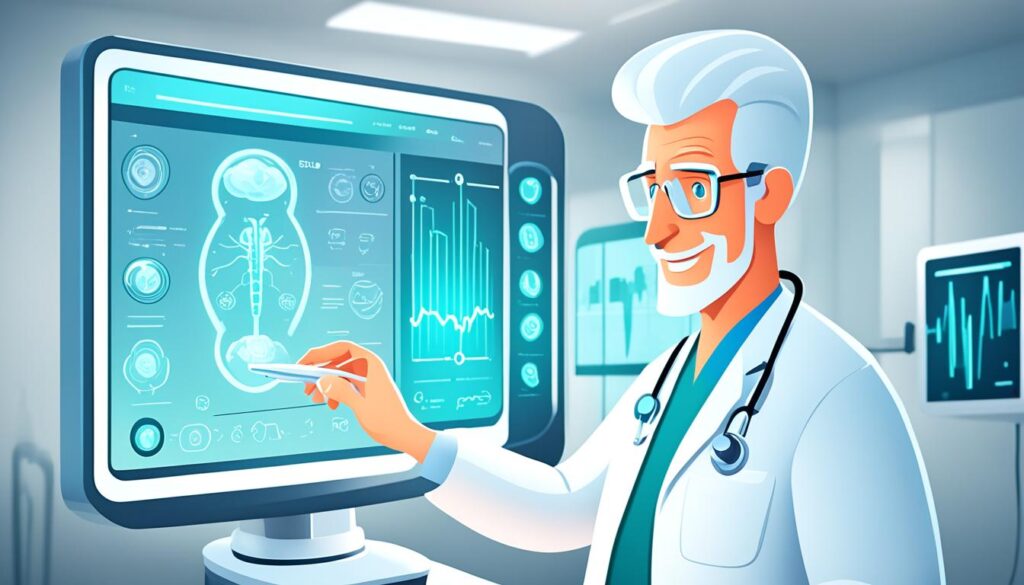Did you know that nearly 41% of healthcare professionals recently surveyed are aware that their patients have used technologies like ChatGPT and Med-PaLM for medical purposes within the last three months? This shows a big change in how doctors and patients interact, thanks to AI healthcare solutions.
Technology has changed how we talk to patients and manage their care. Now, doctors can make more accurate diagnoses and manage patient care better. But, this change also makes us wonder about trust and empathy in healthcare, where machines are making some decisions.
Studies show that a strong bond between doctors and patients leads to better health outcomes. Now, AI tools like generative AI are changing this bond. They aim to help doctors and patients before, during, and after visits, offering care that’s more tailored and based on data.
Looking into how AI is changing healthcare, opinions are mixed. Some see AI as a threat, while others see it as a key improvement. The future of healthcare will depend on how we use these new technologies without losing what’s important in the doctor-patient relationship.
Introduction to AI in Healthcare
Artificial intelligence is changing healthcare for the better. It makes care more efficient, accurate, and focused on the patient. This change lets patients take charge of their health, especially with chronic conditions and remote care.
What is Artificial Intelligence in Healthcare?
AI in healthcare uses technology to do tasks that need human smarts, like diagnosing and treating diseases. Tools like DeepSOFA help figure out how sick someone is and predict if they might die. This helps doctors use resources wisely.
AI also helps doctors by doing routine tasks, so they can focus on harder cases and helping patients. Studies show 72% of doctors think AI will make diagnosing better, and 69% believe it will make work more efficient and improve patient outcomes.
The Rise of AI in Medical Practices
AI is becoming a big part of healthcare because it can handle lots of data well. Digital tools and AI chatbots are making patient care better in areas like urology. But, there are questions about how to regulate AI in healthcare.
New jobs are coming up in managing AI systems, analyzing healthcare data, and creating AI solutions. Doctors need to keep learning about the ethics of AI in healthcare, following rules like the EU GDPR. AI is showing promise in making healthcare better and more accessible across different medical areas.
The Role of AI in Patient Diagnosis
AI is changing how we diagnose patients, making it faster and more precise. It looks at complex medical data quickly and accurately. This is key in spotting patterns and issues that might be missed by humans.
AI helps reduce mistakes and speed up diagnosis, which is great for patient care. It’s especially useful in fields like radiology and pathology.
AI can look at millions of patient records to suggest possible diagnoses. It uses past data to help with treatment plans. For example, Google’s Med-PaLM 2 scored an impressive 86.5% on the U.S. medical license exam, showing how advanced AI tools are in medicine.
AI also helps by offering different treatment options for a condition. This makes it easier for doctors to make informed decisions. It lets them spend more time with patients, understanding their values, and making decisions together.
This approach improves patient satisfaction and strengthens the bond between doctors and patients. It’s a win-win for everyone.
Thanks to AI, doctors could see 25% more patients each day. This means they can still focus on building relationships and making decisions without sacrificing care quality. With AI expected to grow 32 times stronger in the next five years, the future of AI in healthcare looks bright.
Enhancing Patient Care with AI Healthcare Solutions
AI healthcare solutions are changing patient care with new technologies. They make health outcomes better by using automated patient monitoring and predictive analysis. This leads to personalized and accurate AI treatment plans.
Automated Patient Monitoring
Automated patient monitoring is a big step forward in healthcare. It lets doctors watch patients’ vital signs all the time. This helps them spot problems early and act fast, which makes patients better off.
It’s especially useful in critical care units, where it can prevent serious issues and save lives. Studies, like one in the Future Healthc Journal in 2019, show how AI improves patient care and quality.
Predictive Analysis for Better Treatment Plans
Predictive analysis in healthcare uses lots of medical records and real-time data. It makes AI treatment plans more effective and tailored. By looking at trends, it can predict health problems and suggest ways to prevent them.
This not only makes treatments better but also uses resources wisely. A 2020 study in JAMA Dermatology on skin cancer screening shows how predictive algorithms help with diagnosis and care. Using predictive analysis means treatment plans can change as patients’ health does.
AI and the Changing Doctor-Patient Relationship
The impact of AI healthcare solutions on the doctor-patient relationship is huge and complex. AI systems can now read medical scans and tissue samples with great accuracy. For example, AI was better at spotting breast cancer in mammograms than some doctors.
This could change how we make diagnoses, leading to smarter medical choices.
But, adding AI to healthcare needs careful thought on doctor-patient communication and empathy. AI changes how care is given. It can look through medical records to find the best treatments. Yet, doctors are still key in understanding a patient’s life and making them feel safe talking about health.
AI also brings risks like automation bias, losing skills, and privacy worries. There are concerns about unequal healthcare access and biases in AI. These issues show why strong rules are needed to protect doctor-patient communication and keep professional standards high. The Council of Europe wants to make rules for using AI in healthcare.
The question is, should AI help or replace doctors in making diagnoses? Studies don’t clearly say one way or the other. This shows we need a balanced view. AI could save money in healthcare, but doctors might not get more money, which is why focusing on patients is key.
When using AI healthcare solutions, we must make sure empathy, communication, and trust are kept. This way, the important bond between doctors and patients stays strong.
Digital Health Innovations Transforming Care
Digital health innovations are changing healthcare in big ways. They make it easier to get and give care. Thanks to AI in healthcare, we now have many tools like telemedicine and AI help systems.
Studies show how important digital health solutions are. For example, Eric Topol talked about how AI can change medicine in 2019. EşiYok et al. in 2023 looked at how Mobile Health apps help in tough times like pandemics.
The American healthcare system is using AI to help patients more. A big study by the American Medical Association in 2023 found doctors are learning about AI’s benefits. Tools like Google’s Med-PaLM 2 and Sharma’s AI system for telemedicine show how AI can make healthcare better.
These changes are big. For instance, over 40% of U.S. doctors feel burned out. AI tools can help by making things more efficient and less stressful. AI also helps in making fewer mistakes and helping patients better, as seen in a study by Bajgain et al. in 2023.
With 60% of Americans having chronic diseases, AI and wearable devices give real-time feedback. This improves care and outcomes. Also, AI can help cut costs by making inpatient care more efficient.
This shows how digital health innovations can make healthcare better for everyone. They aim for a system that’s more efficient, effective, and focused on patients.
The Impact of AI on Patient Interaction
AI is changing how patients talk to healthcare systems. Tools like AI chatbots and virtual health assistants now meet patients first. They answer health questions and start assessments. These tools make things easier for patients and doctors. But they do more than just make things convenient.

AI Chatbots and Virtual Health Assistants
AI chatbots and virtual health assistants use smart algorithms to change patient care. They handle simple questions, book appointments, and give early diagnoses. This lets doctors focus on harder cases and helps patients get quick advice. But, there are worries about how accurate and personal these chats are.
Telemedicine and Remote Consultations
Telemedicine has made healthcare reach farther by offering remote patient consultations. With AI, telemedicine can now bring medical care to places that don’t have it. AI helps doctors make good diagnoses and suggest treatments, making online visits almost as good as in-person ones. But, we must make sure AI helps, not replace, the human touch in healthcare.
Technology in Healthcare Communication
Technology is changing how patients and doctors talk to each other. AI helps manage and understand huge amounts of health data. This makes healthcare communication technology better. It’s not just about handling data; it also makes communication smoother at every step of patient care.
Places like Northwell Health in New York use text chat services for many patients. This includes those at high risk after giving birth, people with chronic conditions, and those who have had surgery. This shows how AI and health communication make sharing information fast and easy, helping patients get the care they need quickly.
At UC San Diego Health, they’ve added a chatbot to the MyChart patient portal. This has made talking about things like appointments, getting more medicine, and checking test results easier. It shows how healthcare communication technology can make things simpler for everyone, while still supporting patients fully.
Many doctors prefer chatbot answers because they are kind, sound right, and give all the details. A study at UC San Diego Health found that 78.6% of the time, people liked AI’s answers better than what doctors said. This shows how AI and health communication can really improve how patients and doctors talk to each other.
Places like Duke Health use AI to help with paperwork, so doctors can focus on caring for patients and avoid getting too stressed. Thousands of doctors, including those at Emory Healthcare and University of Michigan Health-West, use AI tools like ChatGPT and Microsoft’s AI to write up patient visits and send messages. This shows how important AI is in today’s healthcare communication technology.
The Benefits of AI in Patient Care
AI is changing how we care for patients, making things more efficient and precise. It helps make AI efficiency in healthcare by making tasks easier and less stressful for doctors and nurses.
Increased Efficiency and Accuracy
AI helps by doing routine tasks automatically. This lets doctors focus on the tough cases. AI also makes diagnoses more accurate by looking at lots of data quickly. This means better health outcomes and more trust in AI’s medical decisions.

Personalized Treatment Plans
AI is great at making personalized AI treatment plans for each patient. It uses health data to create plans that fit each patient’s needs. This leads to better treatment following, happier patients, and a better healthcare experience overall.
Challenges in AI Healthcare Implementation
Adding AI to healthcare brings big benefits but faces big challenges. One major issue is getting access to good quality data. AI needs accurate data to work well, but bad data can lead to wrong results.
Privacy and data security are also big worries. Medical info is very private, so keeping it safe is crucial. Healthcare workers must follow rules like HIPAA to keep data safe from unauthorized access.
AI can also be biased, which is a big problem. To make sure AI treats everyone fairly, we must fix these biases. Doctors trust AI more if it’s easy to use and works well. But, combining old medical ways with new AI tech is hard.
Adding AI to current healthcare systems is tough. It needs teamwork between doctors, AI makers, and lawmakers. Making AI fit with current medical practices needs careful planning and strong rules.
A study with 75 people from different fields found many barriers to using AI in healthcare. Doctors are often too busy with paperwork. They want to use AI, but it must be easy and trustworthy.
Some doctors, like family doctors and specialists in certain areas, could really gain from AI. But making sure AI helps all healthcare areas is a big challenge.
To beat these challenges, we all need to work together. We need good planning, strict rules, and ongoing teamwork to make AI in healthcare a success.
Ethical Considerations and AI in Medicine
AI technologies are becoming key in healthcare, bringing up many ethical considerations. The use of AI in medicine raises questions, especially about AI ethics in medicine. For example, a Pew Research poll found that 60% of patients worry that doctors will rely too much on AI for health decisions. Also, 57% fear AI could reduce their personal connection with doctors.
Transparency is a big concern in AI ethics in medicine. Patients and doctors need to know how AI makes its decisions to build trust and ensure accountability. This issue is highlighted in the Journal of Medical Ethics as the “black box” problem. It’s hard for people to understand how AI systems make their decisions.
Accountability is also key in AI ethical considerations. Who is to blame when an AI system makes a mistake? With one in four hospitalized patients facing medical errors each year, clear rules on accountability are needed. This ensures patients stay safe and ethical standards are kept.
Informed consent is crucial in AI ethics in medicine. Patients must know about the AI used in their treatment. It’s important to tell patients about AI in their care plans so they can make informed choices.
Keeping patients’ autonomy and privacy is also vital. Studies show that some patients don’t get the same quality of care. This means we need to keep human oversight in AI use to avoid biases and unfair treatment. Ethical rules should tackle the risks of AI bias and make sure AI helps fair treatment.
Finally, as medical knowledge grows fast, AI can help doctors stay updated. But AI should not replace the human touch in healthcare. Using AI with ethical frameworks that respect human values is key to blending technology with patient care.
Conclusion
Looking ahead, medical AI is set to change healthcare a lot. It can make diagnoses more accurate and give doctors more time by analyzing data automatically. Every year, 12 million serious mistakes happen in the U.S. because of this, AI can cut down on these errors by giving precise insights.
Apple’s study on atrial fibrillation with its Apple Watch shows how wearable AI can help health. AI in healthcare can make prevention and treatment plans tailored to each person. This means better diagnoses and treatments, which helps patients get better faster.
But, there are still big challenges like data privacy and ethical issues. It’s important to solve these problems to make sure doctors and patients trust AI. As we move forward, we need to make sure AI works for everyone’s values and needs. This way, AI can help healthcare in the best way possible for all.
